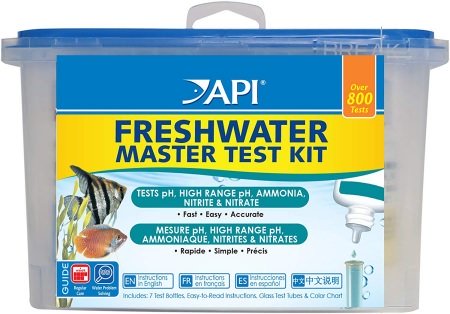| Back to Back Issues Page |
 |
|
The Goldfish Gazette, Issue #074-Water Testing February 28, 2020 |
Goldfish Care TipsA Free Monthly Resource For Goldfish Enthusiasts In This Issue Unless you know what your water parameters are before making a partial water change, you are only guessing whether it is enough to maintain good water conditions. Water Testing Water changes are vital for the well being of Goldfish. They are big eaters producing a lot of waste that is converted into nitrates by your filter. As nitrates build up, the pH starts to drop, and where it was once thought high nitrate levels didn’t affect Goldfish, there is now evidence anything above 30 PPM (parts per million) does start affecting them. Partial Water Changes – How Effective Are They?The amount of water to change depends on who you speak to or what you read. 10%, 20%, 50% daily, weekly, monthly?The reason for this is because those giving the advice don’t know your setup, your fish numbers, your feeding regime, your size and type of filter, so they are guessing. Using the nitrate level as an example of water condition, let’s say your nitrates are at 40 PPM, so they need to be lowered. If you change half the water, the nitrate level would now be a more acceptable 20 PPM. How long does it take for your water to reach 40 PPM again? Two days? A week? Two weeks? If you don’t change 50% of your water when nitrates reach 40 PPM again which might be after two days, then your water changes won’t keep pace with your water pollution rate. Over a relatively short time, your aquarium pH drops dangerously low, nitrates climb, and your fish start getting sick. Taking Out the GuessworkSo, how do we know how often and how much water to change?By testing our water. Using a new setup as an example, with the filter cycled and fish at their final numbers, you need to test every day or two until the water parameters indicate a water change is required. These will be a drop in pH below 7.0, and nitrates above 30 PPM. Make a complete or partial water change and note the date. Now test every day or two until the water parameters have reached the point where another water change is required. You now know how many days it is between water changes. You may find that you need to adjust something if the water changes are going to be too frequent. You may need to:
Once you learn what the best water change frequency is for your setup to maintain optimal water parameters, you should only need to test if something changes such as adding more fish. Don’t forget though, as your water parameters will normally be excellent, your fish will grow, so over time your water changes will need to accommodate for that. Water Test KitsMost fresh water test kits test pH, ammonia, nitrites and nitrates.The ammonia and nitrite tests are only for new setups that are going through the nitrogen cycle, or if you have had some sort of disaster such as a fish dying while you were on holiday. Once an aquarium filter is established, both these tests should register ZERO. No amount of ammonia is acceptable as even 0.5 PPM will cause fish stress. The pH and nitrate tests are the most commonly used tests as they are the indicators to make a water change. These can be purchased separately if you don’t want to purchase a whole test kit, but they are the minimum tests you need. Don't use test strips as the general feeling from most aquarists is that they are too inaccurate. If you keep fish, you need a water test kit. It's a quick and cheap method of working out what your water change frequency should be. To purchase a simple to use water test kit, click here... Comments? Ideas? Feedback? I'd love to hear from you. Just reply to this e-zine and tell me what you think, or what topics you want covered. Next Month's Topic Feeding Enough?www.facebook.com/aboutgoldfish |
| Back to Back Issues Page |